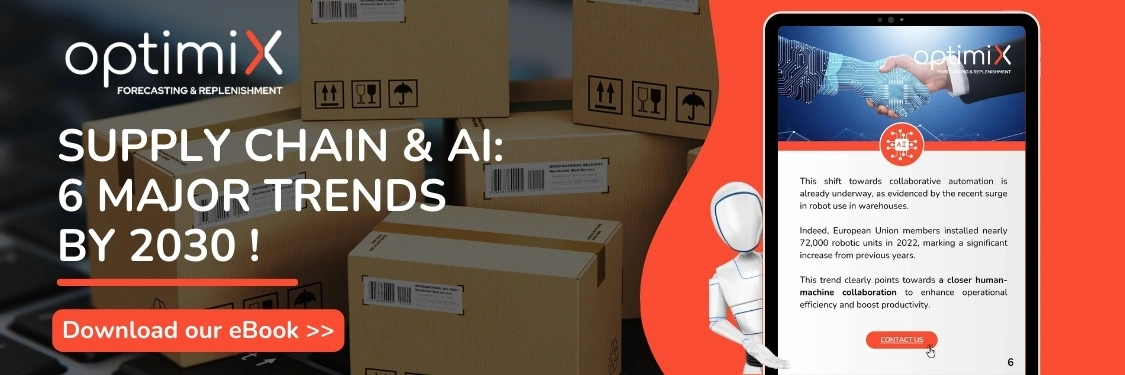The retail and FMCG sectors have yet to fully integrate artificial intelligence into their sourcing strategies.
Consumers are notoriously fickle, which is a major challenge for many retailers. However, it is important to understand that Artificial Intelligence can offer them tools to better anticipating consumer needs and desires.
The emergence of artificial intelligence in retail
The integration of Artificial Intelligence into retailers’ strategies represents a major turning point. Indeed, this new tool will enable them to meet the challenges of a a constantly evolving market.
The emergence of artificial intelligence is forcing retailers to reorganize their supply chains to cope :
- to changing consumer expectations,
- to channel changes,
- to disturbances,
- to uncertainty
This reorganization requires an in-depth analysis of the company’s current strategy, enabling precise adaptation to its specific needs.
Retailers can therefore better optimize their processes to respond effectively to changing market requirements.
Real-time optimization can be achieved through upstream analysis, evaluation of existing methods and identification of areas for improvement.This approach guarantees not only continuous improvement but also agility in the face of fluctuating demand and logistical challenges..

Artificial intelligence: a new tool for managing consumer demand
Artificial intelligence plays a crucial role in managing consumer demand for retailers. AI makes it possible to accurately predict consumer behavior and preferences.
In fact, this predictive capability helps retailers adjust their stocking strategies, plan promotions and personalize offers to better meet customer expectations.
What are the benefits?
The integration of artificial intelligence into consumer demand management offers retailers many advantages. AI makes it possible to analyze vast quantities of data in real time, identify trends and patterns of purchasing behavior that would be impossible to detect manually.
Using advanced algorithms, retailers can accurately forecast fluctuations in demand, optimize stock levels and minimize out-of-stocks and surpluses.
In addition, Artificial Intelligence enhances the personalization of the customer experience by recommending products based on past preferences and behaviors, thus increasing customer satisfaction and loyalty. It also facilitates management of promotions and marketing campaigns by identifying the optimal moments to engage customers.
The bottom line, Artificial Intelligence helps retailers make informed decisions, reduce operational costs and maximize sales..
Transforming your supply chain management with AI
Artificial intelligence transforms supply chain management supply chain management offering advanced analytical capabilities and more accurate forecasts. Thanks to AI, retailers can analyze huge volumes of data in real time, enabling them to detect trends and anticipate fluctuations in demand.
In addition, Artificial Intelligence powers more agile supply chain planning and execution systems. This power supply enables artificial intelligence to adjust rapidly to changes and unforeseen events.
Artificial Intelligence can also be used to optimize logistics processes, and reduce costs and lead times. This enables retailers to identify opportunities for continuous opportunities throughout the supply chain.
Thus, the adoption of Artificial Intelligence represents a major lever for companies seeking to modernize and optimize their supply chain solution.
Many retailers are also expanding their supplier base and sourcing options to add redundancy and diversify sources. This enables them to mitigate the risks associated with disruptions.
For example, a major food retailer might decide to add several suppliers for its flagship products such as fruit and vegetables. By diversifying its sources, the chain can continue to supply fresh produce even if a supplier encounters production or delivery problems.
This strategy of redundancy guarantee product availability on the shelves and meet consumer expectations without interruptioneven in the event of unforeseen disruptions in the supply chain.
Managing and avoiding stock-outs
Efficient supply management is crucial to minimizing stock-outs, which can have a negative impact on customer satisfaction and retailers’ financial performance.
Artificial intelligence plays a key role in inventory management, enabling real-time analysis of data on stock levels, sales and demand trends. Thanks to Artificial Intelligence, retail chains can can anticipate peaks in demand and proactively adjust their orders to avoid avoid shortages.
What’s more, machine learning algorithms can identify consumption patterns and predict future needs with great accuracy.
This enables retailers to maintain optimal stock levels, thus reducing costly surpluses and shortages. shortages.
By automating inventory management, Artificial Intelligence frees up time and resources so that teams can concentrate on higher value-added tasks. For example, improving the customer experience.
Optimize product management and reduce waste
For food retailers, the management of fresh produce is particularly critical due to its short shelf-life. It is essential to minimize losses by adjusting orders according to precise sales forecasts.
For example, a grocery store can use advanced artificial intelligence tools to forecast demand for fruit and vegetables based on seasonal trends and local promotions. These forecasts make it possible to reduce surplus and waste.
With the help of artificial intelligence analysis, retailers can transform the way they manage their assortments.
Using algorithms, they can optimize orders and stocks. This ensures continuous product availability, while reducing the costs associated with unsold products. This approach leads to greater profitability, customer satisfaction and more sustainable resource management.
What’s more, order optimization thanks to Artificial Intelligence enables us to adapt supplies in real time to fluctuations in demand, weather conditions and special events.
This flexibility is crucial to maintaining supply chain efficiency and meeting consumer quality expectations.

Promoting the integration of AI in supply chain management
Day-to-day planning is essential to accurately anticipate and respond to consumer demands. To achieve this, retailers need to invest in advanced sales forecasting tools and integrated management systems that provide real-time visibility of your supply chain data.
To overcome these challenges, it is crucial to break down the organizational silos that often exist within companies. This implies a structural reorganization and the implementation of transparent communication processes between departments. Training can also be provided for in-house teams, to keep them abreast of the latest developments.
By fostering cross-functional collaboration retailers can align their objectives and actions. Thanks to this collaboration, retail chains are more responsive and efficient.
Optimizing operations with artificial intelligence
Artificial intelligence improves operational efficiency by automating certain actions. This automation considerably reduces the time teams spend developing and adjusting the assortment. This allows them to concentrate on higher value-added tasks. In addition to minimizing human error, it also speeds up the marketing process, ensuring that products always meet customer expectations.
By integrating Artificial Intelligence into assortment management, retailers can optimize inventories and ensure that the products most in demand are always available.
AI algorithms continuously analyze sales data, market trends and consumer behavior to adjust assortments in real time. This responsiveness not only improves operational efficiency, but also enhances customer satisfaction by responding more precisely to their needs.

What resources are used to process AI at Optimix?
To optimize your supply chainvarious artificial intelligence models can be used.
- Statistical modelsare well known for their ability to analyze historical data to identify trends and patterns of behavior. These tried-and-tested methods are capable of processing all types of data, including those with marked intermittency or seasonality.
These include ARIMA, moving averages and Croston models. Thanks to their sturdiness and adaptability, these models provide reliable forecasts and help optimize supply chain management.
- Machine learning modelson the other hand, use global algorithms to learn possible product dynamics, thus improving forecasting and optimization results. Unlike traditional models, these algorithms can learn from several time series simultaneously.
- This enables them to identify and understand common dynamics between different products, leading to more accurate forecasts and more efficient supply chain optimization.
- Deep learning algorithms, representing the state of the art in science, offer advanced analysis and prediction capabilities by exploiting deep neural networks . These sophisticated algorithms can process massive volumes of data with unrivalled precision, making the supply chain more responsive and efficient in the face of fluctuating demand and unforeseen events.
The integration of exogenous data is essential for refining supply chain management. For example, public holidays and vacation periods have a strong influence on purchasing behavior, but also on supply possibilities, necessitating a number of adjustments. specific stock adjustments.
The weather also plays a crucial role for certain products, such as ice creams and salads, which are highly sensitive to climatic variations. highly sensitive to climatic variations.
By analyzing geographic data, it is possible to categorize customers by geographic point (latitude and longitude), to determine whether individuals are families, couples, singles or business travelers.
Optimix is able to categorize customers according to their geographical location.This can have a significant impact on their purchasing behavior. For example, a couple will not have the same shopping habits as a business traveler. This precise categorization makes it possible to fine-tune marketing strategies and adapt offers to better meet the specific needs of each customer group.
What’s more, the ability to inject data on exceptional events, such as soccer matches or food scandals, means that we can rapidly adapt strategies to changing customer needs. These adjustments make it possible to respond proactively to fluctuations in demand, thus ensuring optimum product availability.
------------------------------
The integration of Artificial Intelligence in the retail and FMCG sectors marks a real breakthrough in supply chain management. real breakthrough in supply chain management.
Artificial intelligence offers powerful tools for anticipating customer needs and preferences. Thanks to these powerful tools, retailers can optimize stock levels and improve overall efficiency.
By analyzing vast quantities of data in real time, retailers can detect trends, forecast fluctuations in demand and quickly quickly adjust their strategies to avoid stock-outs. If the strategy is not adjusted and there is a potential stock shortage, this can lead to customer dissatisfaction, which in turn can lead to a drop in sales.








